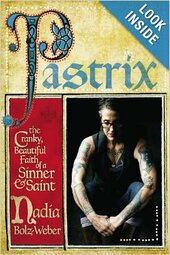Nadia Bolz-Weber is as close to a celebrity pastor as the ELCA has. I've gotten to hear her speak on two different occasions, first at the Extravaganza (a training event for youth workers in the ELCA) and later at the 2012 ELCA Youth Gathering.
On both occasions, I enjoyed her. Yet, even so, I found myself thinking, “What's all the fuss about? Why's this woman garnering so much attention? Is it just because she doesn't look like most clergy in the ELCA?”

Nevertheless, after reading countless positive reviews of her book, Pastrix: The Cranky, Beautiful Faith of a Sinner & Saint, I decided to give it a chance.
I'm glad I did.
Pastrix was, in a word, excellent. It challenged me to think differently – about the outcast, God, and faith. In places it made me weep and perhaps more than anything else, it reminded me of God's extravagant love.
Above all, Pastrix is a book about grace. This is not altogether surprising when you consider that despite her unique appearance, Nadia is still a Lutheran pastor. As such, throughout her book, she reminds her readers what does and does not actually constitute “good news”.
In her words, “The job of a preacher is to find some kind of good news for people. And that good news really should be about who God is and how God works and what God has done and what God will do. (What passes for preaching in many cases is more here's the problem and here's what you can do about it, which I myself have never once heard as being “good news”.)
While I expected Pastrix to be a book about God's grace, I didn't expect it to exegete Scripture as often or as well as it does. Though the book is a memoir, Nadia effortlessly weaves her personal narrative with those found in Scripture. Each chapter starts with a Bible passage, which Nadia then explores throughout the rest of the chapter. Her unique life-experience combined with her experience as the pastor at House for all Sinners and Saints often gives her unique, fresh insights about the stated Scripture. These insights challenge her reader to encounter Scripture anew.
To this end, one of my favorite chapters in the book deals with Jesus' baptism and temptation in Luke 4. Nadia interprets this passage in terms of identity and says, “Identity. It's always God's first move. Before we do anything wrong and before we do anything right, God has named and claimed us as God's own... We are tempted to doubt our innate value precisely to the degree that we are insecure about our identity from and our relationship to, God.”
Beyond that, I loved the glimpses Pastrix offers into the creative liturgical elements Nadia incorporates into the community of House for all Sinner and Saints. For example, one chapter recounts how, after the earthquake in Haiti, her team decides to “make a set of the stations of the cross out of news photos this year.” Reading about the powerful ways in which her community encountered Christ through these stations makes me want to create a similar experience for my own community.
Lastly, as a youth worker, I also appreciated Nadia's reflections on her role as a hospital chaplain and later, as a pastor. In describing her role as a hospital chaplain, she says, "In that messy chaos, my job was to just stand there & be aware of God's presence in the room." In so many ways, I think that's also the job of youth workers.
Beyond that, however, perhaps that's the job of all Christians: To become aware of God's presence in the room and then to point it out to whomever we find ourselves with, hoping that in that moment, we all experience the power of God's grace.
Tags
Latest Posts
- 12 Books You Should Read
- A blessing for youth leaders nurturing faith beyond youth group
- 8 ways to help mission teams conclude more than “poor people are happy”
- The fantasy youth ministry candidate
- What students need most when they’re stuck spiritually
- The tearing of the curtain
- How do you not hate them?
- Messy Ashes
- What it means to be a Bradbury
- The (false) unity of 9-12